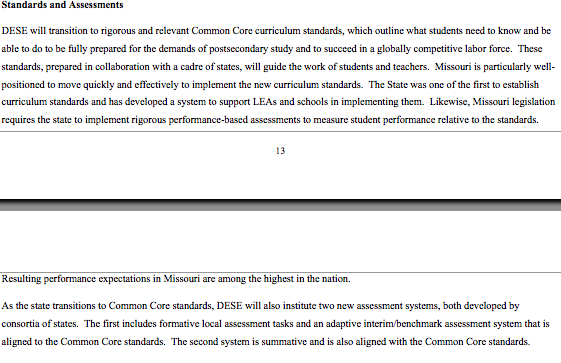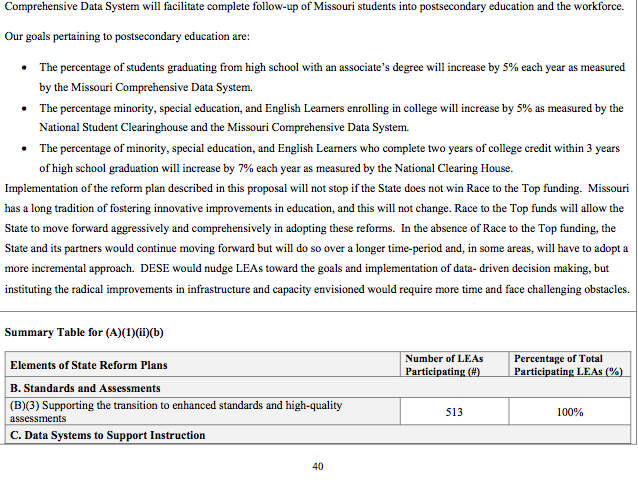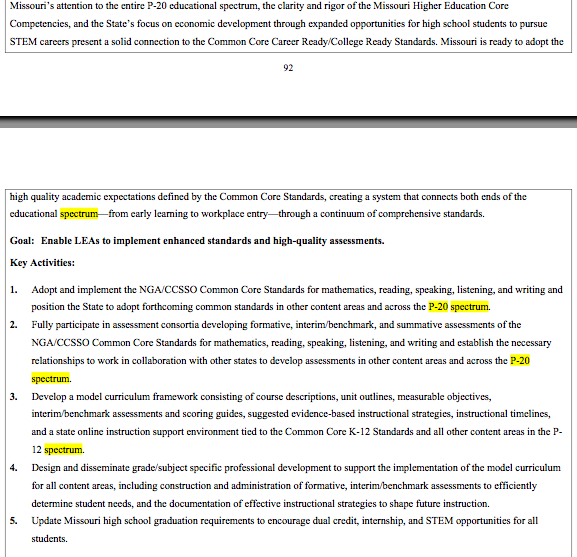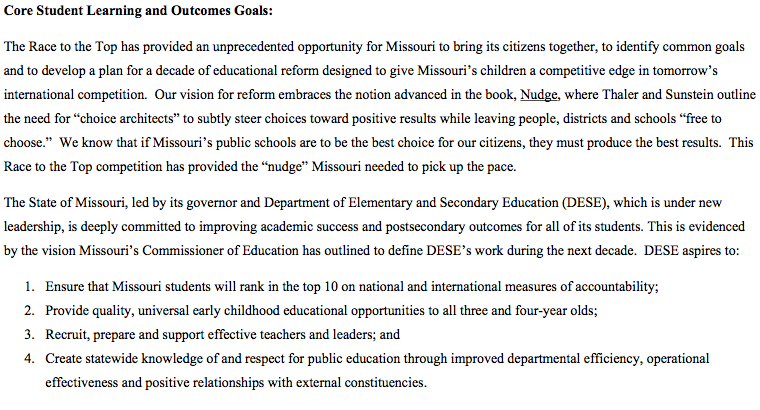[youtube=http://www.youtube.com/watch?v=rH-B6A04iK0]
They’re baaaaack in session and education is a top priority for the Missouri legislature this year. They brought with them, to the capitol, the philosophy that government needs to be in control of your money and your children’s education, too, as is demonstrated by a growing list of educational bills.
As the session begins, it’s time once again to scan the ever growing list of legislation and flag items of interest. So far, there are only a few pieces that homeschoolers, in Missouri, need to keep an eye on.
It is certain that education will be an important subject in this legislative session. Last year, over 135 bills related to educational issues, out of over 2000 were filed. None of them passed, and none advanced local control of schools or autonomy for parents to direct the education of their own children. In fact, most of the legislation filed, in Missouri, was tooled to advance the federal government’s version of educational reform, otherwise known as Race To The Top.
I’ll post more later on the vast Race To The Top/Educated Citizenry 2020/Educational Reform snow job that is about to be done on Missouri taxpayers, but first let’s look at just a few homeschooling sensitive bills.
TAX CREDITS for education: HB1133 introduced by Representative Jay Barnes, who, by the way, has declined to endorse Homeschooling United’s Educational Freedom Pledge, will provide any taxpayer, beginning in 2013, deductions for educational expenses. Some expenses include:
- Educational software that assists a dependent in improving knowledge in core curriculum areas of the school attended;
- Fees for after-school enrichment programs;
- School fees and tuition;
- School supplies required for use during the regular school day;
- Tutoring;
As long as we maintain our current tax structure, this would be a great thing for homeschool families. Many of us would love to have the tax break on educational expenses. And credits are different from vouchers in that they are not regulated with governmental strings attached. They merely require you meet the proof of educational expenditure. HSLDA is a supporter of tax credits under certain circumstances.
One thing to keep in mind, since Representative Barnes declined to support educational freedom, as outlined in our pledge, registration by homeschooling families may or may not be an issue if you receive these credits. Perhaps it would be a good idea if Mr. Barnes added specific language to his bill to protect families and prohibit registration with the state by anyone benefitting from his proposed tax credit plan. Give him a call or drop him a line and let him know you expect any legislation coming out of Jefferson City to maintain your parental rights and educational sovereignty.
COMPULSORY SCHOOL AGE just keeps rearing its ugly head, session after session. Why? Because they know repeated attempts to pass legislation usually are successful. A couple of years ago, homeschoolers lost a great deal of autonomy when similar legislation was “slipped through” during the last minutes of the legislative session. Law makers in Jefferson City know all the tricks and eventually get what they want. They are vigilant.
SB460 is a version of last year’s bill that requires any child who turns five at any time in the calendar year will be enrolled in kindergarten. As it stands now, kindergarten is not mandatory, but if Senator Robin Wright-Jones has her way, it will be.
In addition to lowering the compulsory school age to 5, her bill also offers the opportunity for you to have your child screened by the school district, at an earlier age, (because 5 years old just isn’t early enough) to determine if your child can, or should, start school at 4 years of age or earlier. Now, let’s think about that. How many of you think a school district, that receives funds from the state for average daily attendance, (having warm bodies in seats in classrooms) isn’t going to conclude that your little geniuses are ready for school? Just sayin’.
This bill died last session, but since it has resurfaced in its original form from last year, I’m guessing the ultimate goal is to get your kids from cradle to grave and this is a step in the right direction. Call or write Senator Wright-Jones and tell her it’s a no-go on this bill. Might want to call your own reps and senators, as well, and tell them you don’t appreciate taxpayer’s time and money being spent on writing and promoting this kind of legislation that further chokes educational freedom and parental rights to make educational choices for our children.
SCHOLARSHIPS Ok, this one burns my britches for a couple of reasons. The state of Missouri is now going to offer college scholarships to students who graduate, early, from high school. Don’t get excited. You are a homeschooler and do not qualify for this opportunity. Only public high school students may apply. Really?
Senator Scott Rupp introduced SB483 to give public high school students, who are academically advanced, an edge in college application. Fine. But what about homeschoolers? Many homeschoolers, who have proven to exceed their public school counterparts in academic achievement could really use a break. Especially since we are not only paying taxes to schools we don’t use, but also funding our own educations. The oversight is insulting.
Additionally, the state is broke. Yes, that’s right. Incase you haven’t heard, the budget is an estimated 700-900 million dollars short this year because the legislature has been balancing state accounts with stimulus money for the last few years. 700-900 million are the figures the lawmakers are floating to the public, but there is speculation the deficit will be closer to two billion because the state funds teachers pensions and the piper has come to be paid. And so, someone feels there is need to fund student scholarships, with state money, when balancing the budget is going to be such a struggle, this year.
If you have never before considered, seriously, requiring government to get out of the education business, entirely, perhaps it’s time to entertain the idea.
FINANCIAL AID FOR HOMESCHOOLERS? Really. This bill gets the “Throw Me A Bone of the Year Award.” But perhaps I speak to quickly, because the session has just started, and there will certainly be many more bills filed which could qualify, however, if we are giving money to public school graduates for scholarships, why do we need to reiterate that homeschooled students should be “considered” equally for financial aid, unless Senator Schaaf is countering with SB527, Senator Rupp’s SB438 public school scholarship program, to enable homeschooled students to qualify?
SPORTS PARTICIPATION BY HOMESCHOOLERS Representative Barnes takes a stab at smoothing out the homeschool student’s ability to participate in organized sports with HB 1206. Pretty bold language in the bill. One to watch as the courts may see an onslaught of families filing restraining orders to prohibit their exclusion from public school sports teams. Popping popcorn in anticipation of the festivities.
As bills get added to the long list of legislation, Homeschooling United will keep you updated as to their progress. I will also update our lists of Educational Freedom Pledge friendly and unfriendly representatives and candidates with in the next couple of weeks. Good information to have as elections approach.
Here’s a link to the Senate Education Committee members, and this will link you to the House Education Committee members.




